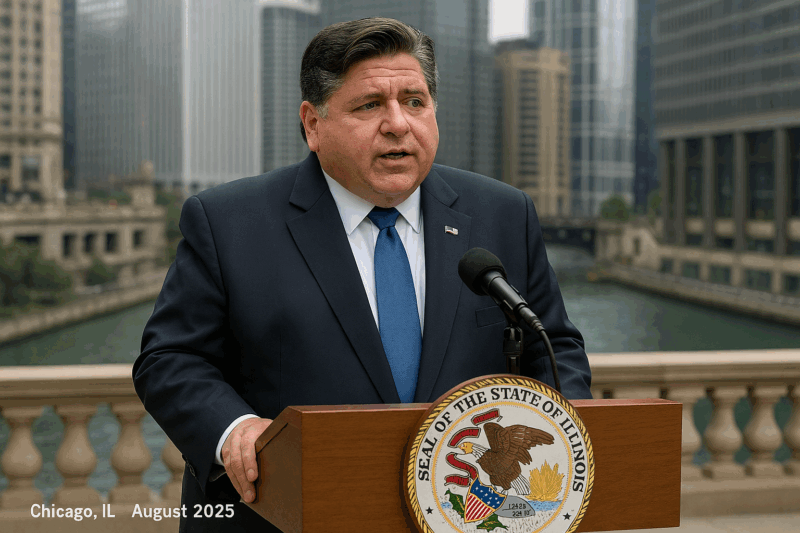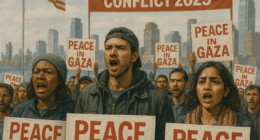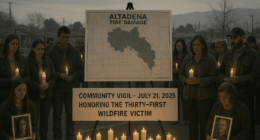President Donald Trump expressed uncertainty about deploying National Guard troops to Chicago, suggesting he might wait for a request from Illinois Governor JB Pritzker, who has firmly rejected the idea. The announcement follows Trump’s controversial deployment of 2,000 National Guard troops to Washington, D.C., and comes amid plans to target Chicago for a similar crackdown on crime, homelessness, and undocumented immigration. This blog explores the human impact, key details, legal context, and potential outcomes of this escalating controversy.
Human Toll
Trump’s threats to deploy federal troops have heightened anxiety among Chicago residents, particularly in communities already wary of law enforcement overreach. Mayor Brandon Johnson, speaking at a South Side block party, emphasized the city’s unity and progress in reducing crime, countering Trump’s narrative of Chicago as a “killing field.” The prospect of militarized streets risks inflaming tensions, especially in minority-majority neighborhoods, where trust in police is fragile. Illinois National Guard members, who could face legal consequences for refusing federal orders, are caught in a political crossfire, potentially forced to act against their own communities.
Community and Political Response
Governor Pritzker, Mayor Johnson, and Illinois’ U.S. senators, Dick Durbin and Tammy Duckworth, have united in condemning Trump’s plan, joined by business and civil rights leaders. At a riverfront press conference on August 25, 2025, Pritzker warned of an unconstitutional overreach, vowing to use “every peaceful tool” to protect Illinois’ sovereignty. Johnson accused Trump of targeting Chicago for its pro-immigrant and pro-labor stance, labeling the deployment threat as “terrorism.” A small conservative group, Chicago Flips Red, supports the move, citing persistent crime, but faces widespread local opposition.
Key Facts About the Controversy
- Trump’s Statements: On August 22, Trump called Chicago “a mess” and suggested it as the next target for National Guard deployment after Washington, D.C., and Los Angeles. On August 25, he wavered, citing Pritzker’s criticism and suggesting he might wait for a formal request, though he added, “We may just go in and do it.”
- Crime Statistics: Chicago police data shows a 36% drop in shootings and a 31% decrease in homicides in 2025 compared to 2024, undermining Trump’s claims of a crime surge. The city’s homicide rate, while higher than New York or Los Angeles, is lower per capita than in other cities.
- Pentagon Plans: The Washington Post reported on August 24 that the Pentagon has been planning a Chicago deployment for weeks, potentially involving thousands of National Guard troops as early as September 2025, similar to the 4,000 troops and 700 Marines sent to Los Angeles in June.
- Executive Order: On August 25, Trump signed an executive order targeting jurisdictions like Illinois with cashless bail policies, directing federal agencies to identify and potentially suspend grants, linking this to his Chicago crime narrative.
Legal and Political Context
The Posse Comitatus Act of 1878 restricts the use of federal military forces for domestic law enforcement unless authorized by Congress or under the Insurrection Act, which Trump has not invoked for Chicago. Unlike Washington, D.C., where Trump has broader authority due to federal oversight, Chicago’s National Guard is under state control, requiring Pritzker’s consent or federalization, which is legally contentious. A California lawsuit challenging Trump’s Los Angeles deployment remains unresolved, signaling potential legal battles if Chicago is targeted. Critics, including Northwestern’s Paul Gowder, argue that federalizing state troops without clear justification violates the constitutional balance of power. Trump’s focus on cashless bail, which Illinois implemented in 2023, ties into his broader narrative but lacks evidence linking it to crime spikes, as Chicago’s crime rates have fallen.
Why This Matters
Trump’s threats challenge the balance of federal and state authority, risking further erosion of public trust in institutions. Deploying troops in a city with declining crime rates could inflame community tensions and divert resources from effective local strategies, like youth programs and constitutional policing, which Johnson credits for a 35% drop in robberies. The controversy also highlights Trump’s pattern of targeting Democratic-led, majority-minority cities, raising concerns about political motivations over public safety.
What Lies Ahead
No formal White House communication has been sent to Chicago or Illinois officials about a deployment as of August 26, 2025. If Trump proceeds, he could federalize the Illinois National Guard or deploy active-duty troops, though legal challenges would likely follow, potentially reaching federal courts. Pritzker and Johnson are preparing legal options, with the ACLU of Illinois arguing that National Guard troops lack training for community policing, risking escalation. Community advocates call for federal investment in violence prevention, housing, and schools—such as restoring $158 million in cut funding—over militarization. The outcome could set a precedent for federal interventions in other cities like New York or Baltimore, where Trump has also threatened action.
Conclusion
President Trump’s wavering on deploying National Guard troops to Chicago reflects a contentious battle over federal power, state sovereignty, and public safety. With crime rates dropping and local leaders united in opposition, the threat of militarization risks undermining Chicago’s progress. As legal and community resistance mounts, the nation watches to see if Trump will push forward or back down. Support Chicago’s community-driven safety initiatives and stay informed through trusted sources like the Chicago Tribune.






